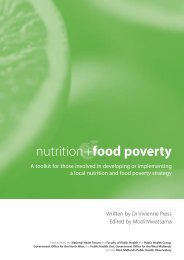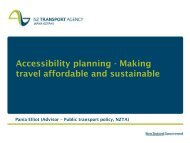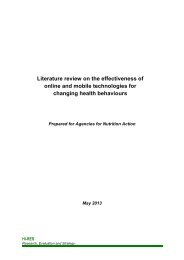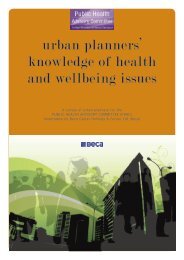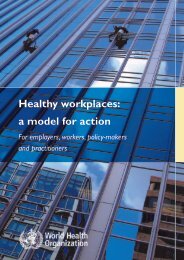enhancing food security and physical activity for maori, pacific and ...
enhancing food security and physical activity for maori, pacific and ...
enhancing food security and physical activity for maori, pacific and ...
- No tags were found...
You also want an ePaper? Increase the reach of your titles
YUMPU automatically turns print PDFs into web optimized ePapers that Google loves.
Enhancing Food Security <strong>and</strong> Physical Activity <strong>for</strong> Māori, Pacific <strong>and</strong> Low-income PeoplesMethodsA brief review of the international <strong>and</strong> national literature on developing capacity wasconducted using Scopus. The literature scan was undertaken in March 2009. TheScopus bibliographical database was searched <strong>for</strong> papers since 1990 with combinationsof keywords: capacity, building, development, work<strong>for</strong>ce, research, indigenous, Māori,Pacific, <strong>and</strong> culture. A Google search was also undertaken. Titles of articles werescanned <strong>for</strong> relevance. Grey literature reports were also used <strong>for</strong> the national reviewonly.Four key in<strong>for</strong>mants well placed to comment on this issue (three Māori <strong>and</strong> one Pacific)were also interviewed to supplement the literature review. These were healthpractitioners <strong>and</strong>/or researchers who have experience in establishing, planning,delivering <strong>and</strong> evaluating capacity development initiatives <strong>for</strong> Māori (n=3) <strong>and</strong> Pacific(n=1).International Literature Review/ScanThe literature consistently highlighted the need to develop capacity building inindigenous people, minority <strong>and</strong> disenfranchised groups. In particular, the developmentof a culturally competent work<strong>for</strong>ce to provide services or implement programmes <strong>for</strong>Pacific 6 7 <strong>and</strong> indigenous people was recommended. 6 8 9 The concept of buildingcapacity is common in international development literature. 10The terms ‘developing capacity’ or ‘capacity building’ are frequently used <strong>and</strong>,depending on the context, can have numerous meanings. Capacity has been defined as“the abilities, behaviours, relationships <strong>and</strong> values that enable individuals, groups, <strong>and</strong>organisations at any level of society to carry out functions <strong>and</strong> tasks <strong>and</strong> to achieve theirdevelopment objectives over time” (p.37). 11 In relation to public health change, capacitybuilding has also been defined in terms of interventions which have changed anorganisation’s or community’s ability to address health issues by creating new structures,approaches <strong>and</strong>/or values. These will be ongoing without the need <strong>for</strong> further funding. 12The latter definition overlaps with typical definitions of sustainability. With respect to thischapter, both these definitions suggest that successful capacity building will result inchanges to the organisation’s “structures, approaches <strong>and</strong>/or values”. This implies thatsuccessful ef<strong>for</strong>ts to develop sustainable programmes will only result from a dynamicprocess of organisational change in response to the new programme. 13Building capacity involves micro (individual), meso (organisational), <strong>and</strong> macro(systemic) level changes over time. 11 Long-term changes are required to supportsustainable systemic or structural improvements. 14 Thus, building capacity should beconsidered a process rather than a single action or intervention. Central to this processare notions of time, human agency, social structures, change <strong>and</strong> sustainability. 10 Withinthe international literature, capacity building has often been examined in the context ofdeveloping countries in which technological <strong>and</strong> infrastructural improvements arenecessary to support human capacity building. These various components of capacitybuilding will now be discussed.How do you build capacity?At a practical level, suggestions have included working with counterparts, creating strongpartnerships, attending to training, empowerment, <strong>and</strong> policy development. 10 Based onprevious reviews of literature two relevant theoretical content areas have been identified151



